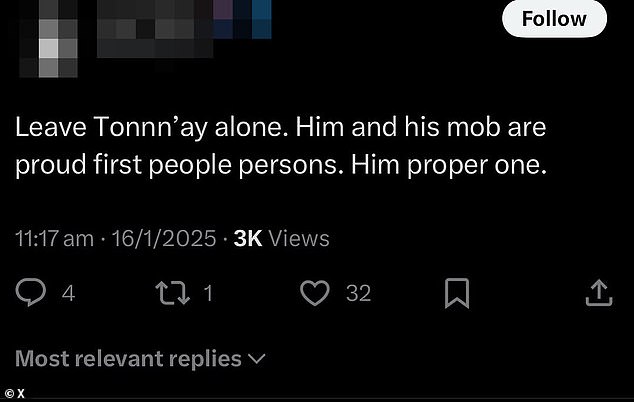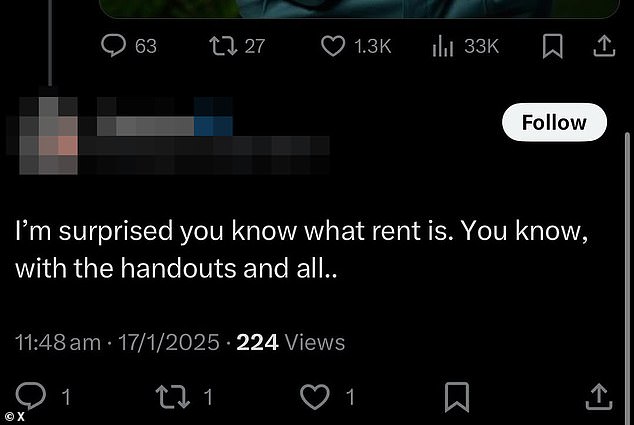- Logie-winning ABC star has urged Australians to pay for nation’s colonial past
- The 35-year-old presenter says it is time to ‘redistribute’ the country’s wealth
- Comes amid First Nations Futures’ #WealthBack campaign
Former ABC News Breakfast star Tony Armstrong has urged Australians to right the wrongs of the nation’s colonial past, backing a campaign that calls for people to pay voluntary, weekly reparations to the country’s Indigenous population.
The 35-year-old television personality threw his weight behind First Nations Futures’ #WealthBack campaign while posting about the project on social media on Friday while hitting back at racist trolls.
The campaign aims to raise at least $400,000 for projects in Indigenous communities by calling people to make ‘weekly or monthly’ donations as a ‘recurring co-investment’ while taking ‘an active step in redistributing wealth’.
In its promotional material, it encouraged non-Indigenous Australian to recognise the nation’s inequality and the economic benefit they had received from ‘living in so-called “Australia”‘ to the continual ‘detriment of First Nations people’.
‘In the lead up to Invasion Day (January 26), First Nations Futures is calling on all people that have benefited from the ongoing colonisation of First Nations lands to give #WEALTHBACK,’ the First Nations Futures explains on the campaign’s office website.
‘#WEALTHBACK means to reckon with past and present wrongs, and participate in the returning of wealth that has been taken. It acknowledges the economic benefit that people living in so-called “Australia” have gained from colonisation.
‘Land theft, slavery, and the ongoing refusal to address this by governments and individuals has created immense wealth inequality in so-called “Australia” – to the continual benefit of settlers and the detriment of First Nations people.
‘It is time for all people to move beyond empty gestures and address the truth that this country is formed from the theft of First Nations lands and wages.


‘Through widespread, active and recurring wealth redistribution, our campaign offers a tangible and meaningful way for all people to participate in collective movement towards justice.
‘#WEALTHBACK is to: Reckon with the history of stolen wealth and how it informs present wealth; Return wealth that has been taken from First Nations communities; Repair past wrongs and pave way for a collective future grounded in justice.’
The campaign’s organisers said they hoped to raise $400,000 ‘to support our First Nations partners in continuing their integral work for community and Country’ and ‘see 250 new people sign up to our funding platform on a recurring basis and redistribute $5 (or more) per week’.
The site’s funding page recommends people make weekly donations of between $15 and $100, monthly donations of between $30 and $200 or ‘once off’ payments of between $50 and $1000.
The organisers said it was incumbent on all Australians to ‘take responsibility’ for resetting the nation’s financial power imbalance.
‘The continuous impacts of colonisation have created unequal ground, where all people living in Australia continually benefit economically from the colonisation of First Nations lands and people,’ the campaign website says.
‘The effects have meant that non-Indigenous people have disproportionate power and access to wealth and resources.
‘While many First Nations community-driven initiatives do not have the sustainable resources to drive the change they want to see.
‘Our communities have been advocating, campaigning and implementing solutions on the ground for generations on limited resources.
‘It is for all people in Australia to take responsibility and redistribute wealth and power in meaningful and ongoing ways.’

Armstrong, who has become one of the nation’s most recognisable television stars since making the switch from an AFL career to one on the small screen, backed the campaign in his post.
‘Reckon it’s time everyone starts redistributing ayyy,’ he wrote under an image of the campaign poster.
Armstrong went on to post responses to some of his critics on social media while highlighting some of the ugly – and racist – comments he is forced to endure online.
‘I love living rent free in these losers’ heads,’ he wrote in response to one user who posted a picture of him alongside while commenting: ‘This smug turd is annoying. A f***ing ego w****.’
When that post received a racist response, he posted that too, saying ‘I’m in the f***in’ mood today.’
Fellow users were quick to leap to Armstrong’s defence, adding comments such as ‘Wow. Another racist f*** trying to attack a great guy’.
Armstrong shared a separate post on Instagram later in the day highlighting the racism he is facing due to his support of the First Nations Futures campaign.
He said he would normally ignore that type comment since he does not ‘want to make a fuss’ but decided to share screenshots of some X posts that had really got to him.

‘I am really angry today. I don’t often share stuff that comes my way. I normally just let it go, because I don’t wanna make a fuss, which is cooked in itself,’ he wrote.
‘This post is to show a snippet of some of the shit that’s come my way in just the last 24hrs.
‘I know some people will look at this and think I need to get over it or think that they’re just words from people who don’t matter. But it hurts & I’m sick and tired of it.
‘People are feeling really comfortable just being flat out racist without any real ramification. This is nothing new to me, but sometimes it gets ya. Today it did.’
The posts he shared included one by a sarcastic X user telling others to lay off the former ABC presenter, leading to replies containing racist stereotypes.
‘Leave Tonn’ay alone. Him and his mob are proud first nations persons. Him proper one,’ the first post read.
‘I’m surprised you know what rent is, you know with all the handouts and all,’ one person replied.
‘He’s more lightskin than me, he gets the best of both worlds,’ another said.


The two-time Logie winner is currently starring in a six-part series for the public broadcast after quitting the ABC’s News Breakfast show last October.
Explaining his decision to step away from the program, he said he felt the time was right to focus on ‘slower things’ rather than maintaining the fast-paced, cut and thrust of daily news.
‘News Breakfast, or news, as we all know, you’re tethered to a desk. So you always have to come back to something,’ Armstrong explained to the panel.
‘It’s harder to do the slower thinking. So working on a few things like that.
‘I won’t be on telly as much as I have been. But I’ll be around.’
He courted controversy last month after a promo his new factual series, titled Eat The Invaders, which debuted on the ABC last week last week.
The series investigates whether it consuming invasive species such as carp, deer, camels, and cane toads could be a ‘tasty solution’ to safeguarding Australia native biodiversity from foreign pests.
In the trailer, Armstrong is seen holding a notoriously toxic cane toad, with a large knife precariously positioned above the creature.
‘But what if we could help? By re-imagining this problem as a tasty solution,’ Armstrong asks.

The series is expected to feature six meals, each centered around a specific invasive species as the primary ingredient.
However, in a column for the Sydney Morning Herald, Dr Carol Booth, the Principal Policy Analyst at the Invasive Species Council, condemned the idea of eating cane toads, which were introduced to Australia in 1938, with its population surging from 102 toads to more than 200million.
Dr Booth stated that while the idea of consuming invasive species might be well-intentioned, it could actually worsen the situation.
‘It’s an appealing pitch, and the intentions are good, but believing that eating Australia’s invasive species will solve the problem is unrealistic and could exacerbate the issue,’ Dr Booth said.
‘The show, by showcasing these animals as food, risks making their presence more desirable – creating a dangerous paradox that could lead to the further spread of some species.’
Dr Booth added that the Invasive Species Council had raised the issue with series producers, but their efforts went unheeded.
‘This is something the Invasive Species Council raised with the makers of the show back when it was just a concept. Unfortunately, our biology-based message was not so delicious,’ she said.

First Nations Futures was set up three years ago to ‘respond to the economic barriers that First Nations community-driven initiatives face within funding systems’.
‘The journey of First Nations Futures has been slow, intentional, and has included many yarns and workshops with First Nations leaders and young people along the way,’ it said on its websits.
‘Throughout these conversations, we focused on exploring and co-designing a funding mechanism that could facilitate long-term wealth redistribution, unrestricted funding and First Nations self-determination.
‘While also understanding our scope and model of impact – bound by cultural values, ethics of custodianship, and investing in our future generations.’



